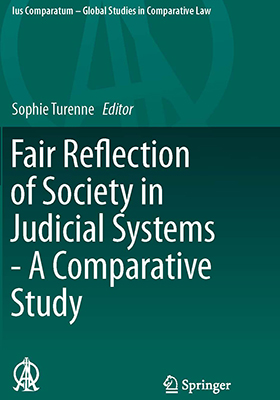 Springer has published Fair Reflection of Society in Judicial Systems - A Comparative Study edited by Dr Sophie Turenne.
Springer has published Fair Reflection of Society in Judicial Systems - A Comparative Study edited by Dr Sophie Turenne.
'Fair Reflection of Society in Judicial Systems - A Comparative Study' draws together for the first time a range of perspectives on the thorny relationship between the principle of judicial independence and the idea of democratic accountability of the judiciary. Leading scholars and national experts, spanning ten jurisdictions and four continents, discuss the concern that judges should have some knowledge of the community they live in so that justice is administered ‘in the name of the people’. If justice is to be done in the name of the community, how far do the decision-makers need to reflect the community, either in their profile or in the opinions they espouse? One recurring theme in the collection is that components of public confidence in the judiciary can be more widely defined than they are today in many judicial systems, and that judicial policy makers should go beyond the assumption that the composition of the highest courts is the core instrument to achieve a fair reflection of the community. Several contributors show instead how that public respect for the judiciary can be gained by other procedural reforms which vary according to the legal culture of the jurisdiction.
For more information about this book, please refer to the Springer website. For information about other publications by Dr Turenne, see her Faculty Profile.

 Facebook
Facebook  X/Twitter
X/Twitter  Instagram
Instagram  YouTube
YouTube  Flickr
Flickr  LinkedIn
LinkedIn